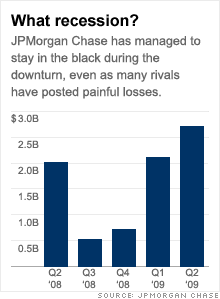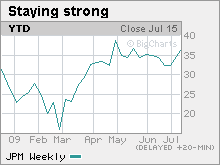JPMorgan Chase earns $2.7 billion
Banking giant easily surpassed Wall Street's estimates for the second quarter, as investment banking performance offset consumer-related credit losses.

 |
| JPMorgan Chase chairman and CEO Jamie Dimon said he was "pleased" by the bank's better-than-expected results. |
 |
| Shares of JPMorgan Chase have managed to remain higher after rallying in March. |
NEW YORK (CNNMoney.com) -- JPMorgan Chase once again proved that it has been one of the better-run banks during the financial crisis after reporting quarterly results that blew past Wall Street estimates.
Buoyed by a solid performance in its investment banking division, the company said Thursday that profits in the second quarter rose 36% from a year ago to $2.7 billion, or 28 cents a share.
That profit came despite a $1.1 billion one-time reduction to earnings as a result of the company's decision to repay $25 billion in government money received under the Troubled Asset Relief Program.
Thursday's results will most likely add to the ongoing debate on Wall Street as to whether the worst is indeed over for the nation's banks and if a recovery is already well underway.
On Tuesday, rival Goldman Sachs (GS, Fortune 500) delivered blowout second-quarter results, reporting a profit of $3.44 billion that were far better than expected.
"The surviving banks are benefiting from the shakeout in banking," said Len Blum, managing partner at New York based investment bank Westwood Capital. "Goldman Sachs and JPMorgan Chase are clearly the winners."
Heading into Thursday, few analysts were expecting the quarter to turn out so well for the bank. Consensus estimates were for the company to book a profit of $280 million, or just 4 cents a share.
Some bearish analysts even suspected that the firm might swing to a loss in the quarter, given its significant exposure to the American consumer.
JPMorgan Chase (JPM, Fortune 500) stock declined over 1% in Thursday trading however, as investors tried to recoup some profits following a run-up in its shares earlier this week.
JPMorgan Chase chairman and chief executive officer Jamie Dimon said he was "pleased" by the firm's latest numbers, even as the results were weighed down by higher credit costs, particularly in the company's consumer-related businesses.
Both the company's consumer lending and credit card operations lost money in the quarter, hurt in large part by the company's decision to set aside more money to cover bad home equity and student loans as wells as future credit card losses. Credit costs in the company's credit card division alone were $4.6 billion during the quarter.
Mike Cavanagh, JPMorgan Chase's chief financial officer, acknowledged that the bank's card business was likely to remain unprofitable both this year and next as the nation's unemployment levels remain elevated.
Analysts pointed to other credit-related problems as well.
Rochdale Securities bank analyst Dick Bove expressed concern about rising levels of non-performing assets, or loans that are not collecting interest or principal payments, which nearly tripled to $17.5 billion in the quarter from $6.2 billion a year ago.
"The key in looking at these banks to us continues to be the direction of non-performing assets," Bove wrote in a note to clients Thursday. "This was not good for this company."
Despite the economic climate, the New York City-based firm maintained that it was still extending credit to consumers, small businesses and municipalities. During the quarter, the bank said it issued approximately $150 billion in new loans.
JPMorgan Chase's investment banking division, which reported a profit of nearly $1.5 billion, up from $394 million a year ago, more than helped offset problems in the consumer lending unit.
Fees in the JPMorgan's equity underwriting business, for example, soared to a record $1.1 billion, after a number of top financial firms, including itself, issued stock as part of an effort to repay TARP funds.
The disappearance of rivals such as Lehman Brothers and the weakened state of peers like Citigroup has helped the bank assert its dominance on Wall Street, as has last year's purchase of Bear Stearns.
The company has also boosted its profile on Main Street. Last fall, it significantly widened its retail banking footprint with its high-profile purchase of the failed Seattle-based thrift Washington Mutual.
Chase has been working hard to integrate both acquisitions and Dimon hinted the bank may be willing to grow even further at a time when both its rivals and smaller lenders are suffering as a result of the recession.
In a briefing with reporters, Dimon did not rule out the possibility of undertaking another purchase in the future, noting only that it would have to make sense for the larger firm.
"We are still in the position that if something proper presents itself, we would definitely consider it," he said.
Other top-tier financial firms are slated to report their quarterly results in the next week, with both Citigroup (C, Fortune 500) and Bank of America (BAC, Fortune 500) due up Friday. Both Morgan Stanley (MS, Fortune 500) and Wells Fargo (WFC, Fortune 500) will publish their latest numbers next Wednesday.
Talkback: Are you living on minimum wage? What would the nationwide hike to $7.25/hour mean for you? Is the minimum wage enough to live on? E-mail us your story and you could be part of an upcoming article. For the CNNMoney.com Comment Policy, click here. ![]()

